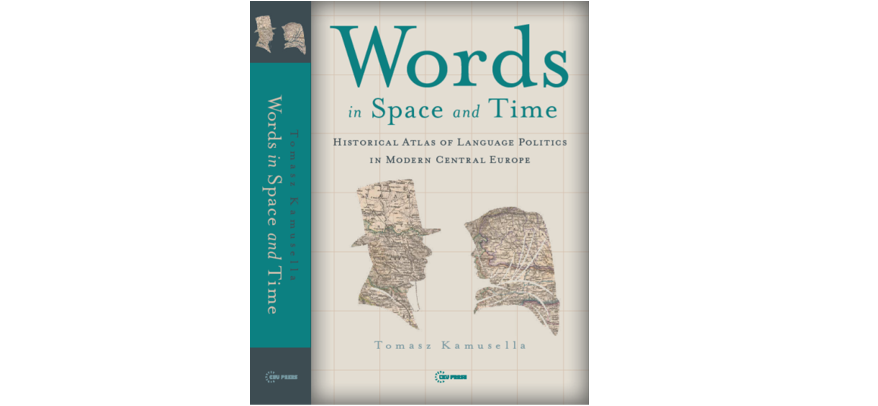From Digitalization to the Democratization of Knowledge

Posted by Tom Grady on June 16, 2021 at 1401
An interview between Dr Tomasz Kamusella, Reader at the University of St. Andrews, UK, and Emily Poznanski, Director CEU Press.
Dr Tomasz Kamusella is the author of Words in Space and Time: A Historical Atlas of Language Politics in Modern Central Europe, a forthcoming open access title published by CEU Press under the Opening the Future project.
What is your opinion of open access? And what were your impressions when your book was selected for the Opening the Future project?
It is an honor and a dream fulfilled that Words in Space and Time: A Historical Atlas of Language Politics in Modern Central Europe was selected to inaugurate CEU Press’s innovative Open Access publishing project Opening the Future. My personal conviction as a researcher and intellectual is that the overall aspiration should be to guarantee for everyone equal access to all Humankind’s knowledge. This belief is underpinned by my experience of education in communist Poland, where access to publications was severely restricted and meticulously censored by the totalitarian regime. When communism collapsed in the annus mirabilis of 1989, the economic tribulations of the transition period made it all but impossible to purchase books from abroad, when one’s average monthly salary was about $20 in the early 1990s. The internet as a widely available alternative source of readily available information arrived only a decade later, at the turn of the 21st century.
Can you share some background on Words in Space and Time: A Historical Atlas of Language Politics in Modern Central Europe?
This atlas Words in Space and Time, on which I have worked since 2009, is connected to my extensive comparative and ‘transnational’ monograph The Politics of Language and Nationalism in Modern Central Europe (Palgrave 2009). I began researching the book in 1998 before the internet and email became ubiquitous. It was still the time of paper libraries and archives. But I had no time and funds to travel to such libraries and archives in tens of Central Europe's states. Hence, I had no chance to research my book as I planned within a sensible period of time. Fortunately, I won a fellowship to the Kluge Center for Scholars in the Library of Congress, Washington DC. During the academic year of 2003/04 I gained access to all the necessary books and publications deposited in this largest library in the world. However, many volumes published between 1850 and 1980 were literally disintegrating in my hands.
How should digitization and open access initiatives co-exist? How do these two trends come together in your research practice?
The precarious existence of books published in this period and access to the Library's holdings became the two most hotly discussed issues during the annual meeting of the Kluge scholars with the Center's and the Library's management. Most agreed that paper books should be deacidified as a matter of course and preserved in the function of master copies for the future generations. We proposed that for the ease and efficiency of use, most readers should be given e-access to digitized or scanned content. On the other hand, the consensus emerged that the responsibility of the Library of Congress was not only to the US government or the United States as a country, but actually to the entire world. This Library as de facto the globe's most significant custodian of human knowledge, apart from gathering and preserving publications, should also make them accessible to interested users across the world. The Library's mission coupled with the internet could allow for the unprecedented democratization of knowledge, making it available to top-notch and budding researchers, to students and any interested reader in all corners of the planet. Equality of chances in the fields of education and research would progress beyond the confines of a laudable ideal into the real-life world, be it in Kecskemét, Varanasi, Hohhot or Guadalajara.
Numerous digitizing projects of entire libraries and archives followed during the past two decades. Increasingly more publication, information and research is available online. However, during the past five years, the move toward Open Access for all publicly-funded research publications has become a new norm and goal. CEU Press with its own Opening the Future scheme trailblazes this new ground as Central Europe's leader in this regard.
From your perspective, what is the future of open access?
Open Access does not (yet?) equate the twilight of the paper book. A book of this kind published on good quality non-acidic paper and stored under stable conditions has a chance to survive easily for half a millennium. On the other hand, hard drives and other electronic means and devices of storing information have much shorter durability, ranging from a couple of years to a decade or two. Hence, publishing paper books in the function of master copies is a must. Otherwise, if a worldwide erasure of hard drives occurs due to a computer glitch (virus), a collapse of the electric grid, a burst of cosmic radiation, or a collapse of state structures, we as Humankind face the danger of losing whole swathes of knowledge overnight. CEU Press is perfectly placed to address this dilemma by publishing exquisitely manufactured non-acidic paper books, while at the same time democratizing access to Humankind’s knowledge through the Opening the Future scheme.
Publisher’s note: All CEU Press ebook files are stored and preserved with Portico (https://www.portico.org/) who ensure migration to new digital formats as and when necessary over time. And all books are available for purchase in print whether published open access or not.